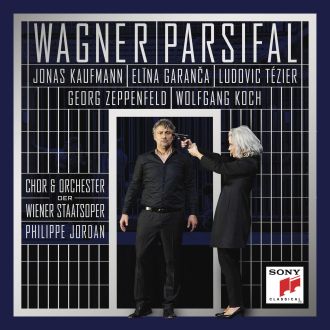 Stage+ hosts the film of this Russian-prison Parsifal, directed (via Zoom)
by Kirill Serebrennikov in Vienna in 2021. Anyone discomfited by potential
overlaps between Wagner the dramatist and the recently decapitated merchant
army should find that this audio-only version has much to recommend it. Sony
has captured a cast fully inhabiting their roles in the moment yet
uncompromised by staging noise or unreliable balance perspectives of the
kind usually attendant on such projects – such as the last Vienna Parsifal
(DG, 6/06), which presents the most salient point of comparison.
Stage+ hosts the film of this Russian-prison Parsifal, directed (via Zoom)
by Kirill Serebrennikov in Vienna in 2021. Anyone discomfited by potential
overlaps between Wagner the dramatist and the recently decapitated merchant
army should find that this audio-only version has much to recommend it. Sony
has captured a cast fully inhabiting their roles in the moment yet
uncompromised by staging noise or unreliable balance perspectives of the
kind usually attendant on such projects – such as the last Vienna Parsifal
(DG, 6/06), which presents the most salient point of comparison.
The
most striking sign of Serebrennikov’s agency arrives (appropriately enough)
through a literal absence – of the usual histrionic cry from the knights in
Act 3 as they shrink back from Amfortas.
The star tenor sounds like a
weather-beaten wanderer even from his first entrance, though untouched by
his recent vocal afflictions. The notion of an ‘experienced’ Parsifal looks
on paper like a contradiction in terms, yet there is much to be said for the
confident, reflective figure portrayed by Kaufmann even in Act 1 – a hero we
can believe in – rather than the artless naïf which often makes a cipher out
of the opera’s nominally central figure.
Kaufmann gives as good as he
gets from Garanča in Act 2 and Zeppenfeld in Act 3, which is saying
something, because these are gripping portraits indeed. Zeppenfeld has for
some years made a highly articulate Gurnemanz – no need for a libretto if
the original text means something to you – but his coloured account of the
first-act narration now gives us much more than the time-honoured,
third-party unfolding of the back story, dropping heavy hints of the
one-time squire as an independent but impotent actor. Whatever the
individual details of Serebrennikov’s production, Zeppenfeld registers in
Act 3 all the overtones of a John the Baptist figure of undimmed fervour,
which Wagner evidently had in mind.
Meanwhile Garanča’s Kundry – her
debut in the role – is sumptuously sung even in one-line dialogue, flashes
of anger or self-pity; the most vocally opulent Kundry since Ludwig for
Solti (Decca, 4/73), but more fully resolving the role’s paradox of
seductress/penitent by effacing old traces of hieratic declamation in the
part. As another debut bringing new insights, Ludovic Tézier’s Amfortas
returns such lyric firepower with interest in his two solos, Wolfgang Koch
effectively soft-pedals the elements of caricature in Klingsor, and the
excellent supporting cast features a strongly differentiated line up of
Flowermaidens.
Jordan’s direction is spacious but more responsive (to
both his singers and the score) than his father Armin’s for the Syberberg
movie (reissued in soundtrack form on Erato, 8/82). Take the transformation
scenes in the outer acts, the second being properly more raw and urgent than
the first rather than a straightforward mirror image. This is not conducting
that draws attention to itself by means of extremes of tempo or
hyper-refined textures. For a Parsifal to be led so vividly by the
personalities on stage makes a welcome change.
|